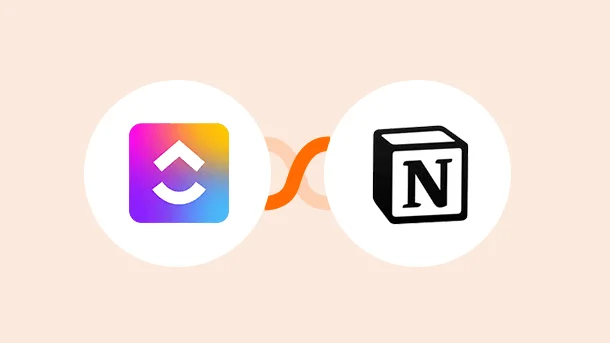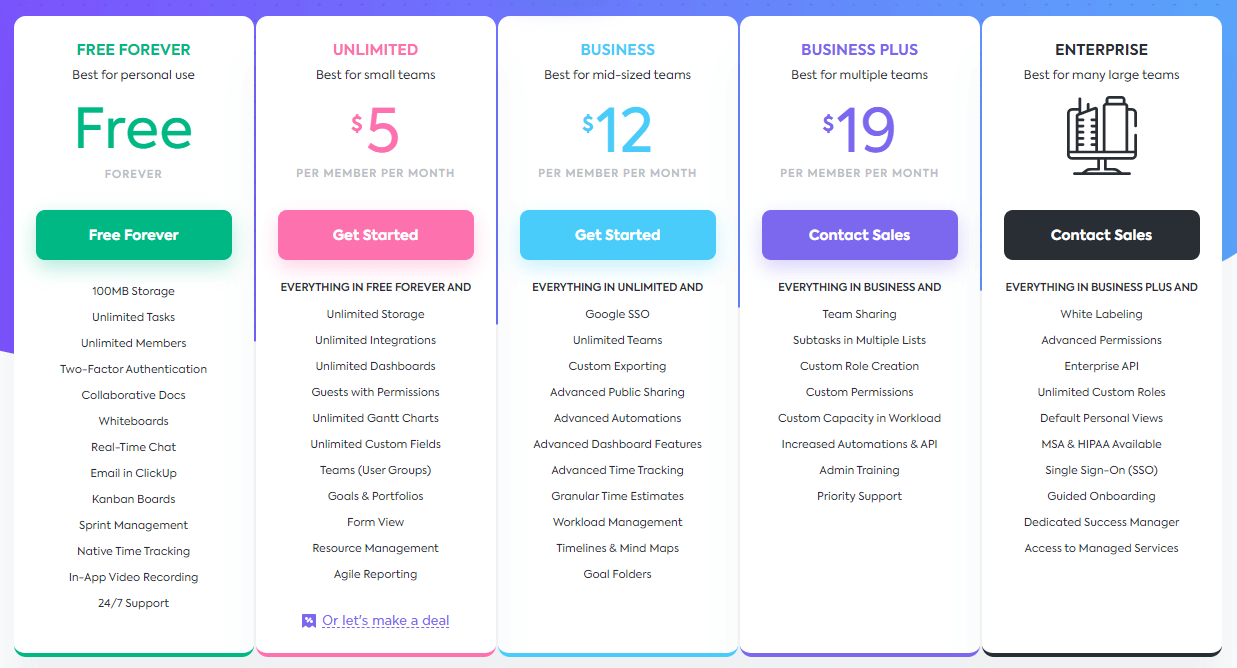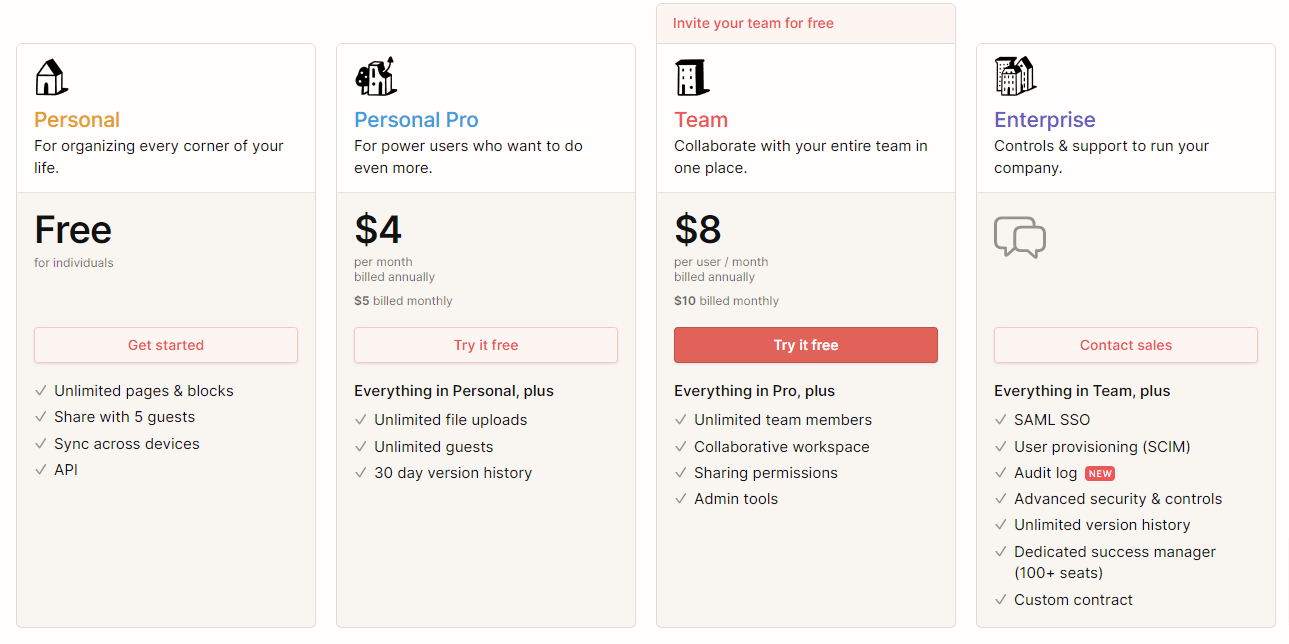
The main difference between ClickUp and Notion is that ClickUp is hierarchically structured into teams, spaces, projects, lists, tasks, and sub-tasks. In comparison, Notion is structured into pages and sections. It is a cloud-based project management software that can help users manage teams and projects easily from a single point.
ClickUp offers tons of features and configurations that make the workflow smooth by enhancing collaboration and visualizing data. For example, Kanban boards, lists, calendars, and timeline views will provide a better perspective on how work is done.
Moreover, ClickUp has a relatively friendly interface with features like filtering, color-coding, and communication tools to communicate with teammates instantly. It all results in increased productivity.
On the other hand, Notion is a cloud-based platform that helps users organize their work, take notes, create lists, and manage tasks using a simple interface. It allows users to collaborate with others and integrate with many popular platforms.
People can use Notion either for personal purposes or to manage businesses, making it a good option for a wide range of clients.
As we can see, both ClickUp and Notion are useful platforms. So, in this article, we will discuss the differences between the two to help you choose the best one for your business.

Integrate Clickup With 750+ Apps In 1 Click
No Learning Curve. Built For Non-techies.
| Features | ||
|---|---|---|
| Concept | A project management platform that helps with managing teams and projects | A project management tool that provides an accessible, collaborative workspace and document database for both individuals and businesses |
| Layout | Tons of settings and customizations with many ways to visualize data | Less complicated customizable sections and blocks |
| User experience | A lot of configurations might confuse the user | A more straightforward, structured interface |
| Customizable workspaces | ✓ | ✓ |
| Built-in automations | ✓ | Only when using Notion API |
| Integrations with other apps | ✓ | ✓ |
| Number of members | Unlimited in all plans | Just you in personal and personal pro plans, unlimited in a team plan |
| Number of views | Lists, Kanban board, calendar, timeline, Gantt, activity, and Table view and more | Lists, Kanban board, calendar, Gantt, Box, Map, Table, and Activity view |
| Ease of Use | It needs tutorials in order to make use of all offered features | Simple and fast to learn |
| Mobile App | Available on Android and iOS | Available on Android and iOS |
| Pricing | Free plan Unlimited plan $5 Business plan $12 Business plus plan for $19 | Individual: $0 Personal for $0 Personal pro for $4 Team for $10 |
| yes/no | ✓ | ✘ |
We can notice there are critical differences between ClickUp and Notion. So, users must know these differences and how they work before deciding which one is better for them and which is not. However, below are the most important differences that will help make the right decision.
The simplicity of the software is essential, especially when a company has a majority of non-tech-savvy employees. However, ClickUp, as we said, offers a lot of features and configurations, so it can be confusing when in use for the first time; despite its nice interface, a lot of options make it feel overwhelmed, so users definitely need some tutorials before using it.
On the other hand, Notion has a simple structure and interface, with organized sections and blocks that make it easy to use and understand, especially for individuals and freelancers. Moreover, in Notion, there are fewer options to think about, unlike ClickUp.
🏆 Winner: Notion
Automations can make the work easier, increase productivity, and save time. However, ClickUp offers built-in automation without third-party tools; automation is essential, especially if users have tons of repeated tasks. For that reason, imagine how much time users will save when using ClickUp.
Notion, on the contrary, has no built-in automation, which is considered a big con for the tool. So, if users want to automate some tasks, they will have to use a third-party tool like integration platforms.
🏆 Winner: ClickUp
Both ClickUp and Notion are trying to satisfy all their clients and attract new clients as well. However, we can notice that ClickUp is striving to be an all-in-one platform, with all features available.
Every time the users dive deeper into ClickUp, they will learn about new functionalities that would facilitate their work. So, it’s suitable for big projects and big companies.
Also, ClickUp offers a freemium plan with many features available. The paid plans cost less than other project management tools, making them suitable for individuals and companies.
On the other hand, Notion focuses on simplicity and personal usage. It may offer less than what big companies need, making it an excellent option for individuals and freelancers or anyone who wants to use it alone. Still, project managers should consider upgrading their plan to a team plan if they will use it with a team.
🏆 Winner: ClickUp
Looking at cost is an essential activity before deciding which one to use. However, both are offering good plans, so we will list these plans for ClickUp and Notion, and you can choose the right one for your budget.
Monthly Plans:
Annually Plans:
As we saw, ClickUp offers a freemium plan with many features available and unlimited members; users can also upgrade to get infinite spaces unlocked.

Monthly Plans:
Annually Plans:
It’s important to note that personal and personal pro plans offer only one member. So, if you have a team, you need to upgrade to a team plan.

🏆 Winner: ClickUp

Integrate Notion With 750+ Apps In 1 Click
No Learning Curve. Built For Non-techies.
Integrations are important when we talk about project management platforms, as they can help transfer data between multiple platforms and automate tasks, saving time and effort.
Both Click and Notion are offering Native integrations; we will list some of them below:
| ClickUp | Notion |
|---|---|
| Slack | Slack |
| GitHub | GitHub |
| Google Drive | Trello |
| Timely | Jira |
ClickUp offers tons of native integrations, unlike Notion, which is a significant advantage for ClickUp. If the built-in integrations are not enough, users can rely on third-party tools to help them, such as Integrately. An affordable and efficient integration platform.
Integrately Ready-To-Activate integrations both for ClickUp and Notion. Besides that, Integrately also provides the ability to build personal automation with no-code experience at all.
8 Million+ Ready Automations
For 750+ Apps
The best decision to increase productivity and enhance collaboration is to use project management software; as we know, investing in tech can add tremendous value to any organization. However, the only thing left to choose is the right platform for the business requirements, budget, and goals.
Both ClickUp and Notion are a great advantage for a company or an individual utilizing them. Still, optimizing their outcomes depends on choosing the correct one based on what the company is looking for.